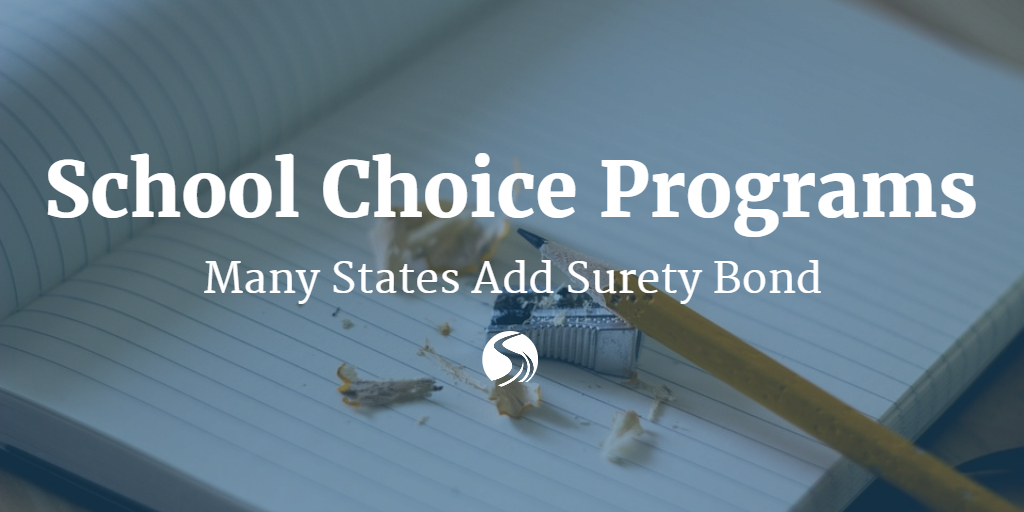During the past year, Oklahoma, Tennessee and Wisconsin have adopted or revised various surety bond regulations regarding school choice programs. In many states, private and charter schools must maintain surety bonds to protect students in the event of an unexpected school closure. The surety bond ensures that the school is financially viable and can reimburse tuition and state funds if the need arises.
Oklahoma
Oklahoma regulates some charter and private vocational schools and requires certain surety bonds. Last year, the Oklahoma Board of Private Vocational Schools (OBPVS) required new private vocational schools to post a $5,000 surety bond upon initial licensing. New regulations mandate that the $5,000 surety bond is the minimum required bond amount, and the bond amount will be calculated based on 10% of projected aggregate tuition plus student fee revenue for the first 12 months after licensure.
In subsequent years, the private vocational school’s surety bond amount will be based on 10% of student payments collected during the previous year, rounded up to the nearest thousand. The school must be financially stable and in compliance with all other laws. Schools’ surety bonds can be no more than $50,000—unless it is not financially stable, in which case the OBPVS can increase the surety bond up to $250,000 for the school as a whole or for each branch of the school, at their discretion.
Contact Nora House at the OBPVS at [email protected] or (405) 528-3370 for more information on licensing a private vocational school. Then, contact a surety expert to purchase your Oklahoma surety bond.
Tennessee
Nonpublic schools participating in Tennessee’s Individualized Education Account Program will need to post a surety bond following the adoption of new rules by the state Department of Education. The IEA program creates accounts that eligible students with disabilities can use for educational purposes, giving parents access to their student’s state educational funds to personalize their child’s education. The IEA was created in 2015 with the passage of the Individualized Education Act, and accounts are expected to be disbursed beginning in January 2017. The program is similar to school choice programs adopted by several other states.
Nonpublic schools participating in the program must submit proof of financial viability to the Department, in the form of a surety bond or a statement from a CPA. Schools can only submit a CPA’s statement if they have operated as a Category I, II or III nonpublic school (according to State Board of Education Chapter 0520-07-02) for five or more years. The financial security ensures the school can repay any funds up to the expected amount of IEA funds they receive during the school year. The surety bond amount is calculated by multiplying the maximum number of IEA-eligible students the school can enroll by $1,600 (if a school can enroll 10 IEA-eligible students, they would need a $16,000 surety bond). If a nonpublic school can use a CPA’s statement as proof of financial security, the school must be able to demonstrate its ability to pay an amount equal to the amount of IEA funds paid to the school.
Contact the Tennessee Department of Education’s IEA team at [email protected] or (615) 253-3781. SuretyBonds.com can help you get bonded in Tennessee.
Wisconsin
Wisconsin offers several school choice programs: the K-12 Private School Tuition Deduction, the Parental Choice Program, the Parental Private School Choice Program (Racine), the Milwaukee Parental Choice Program and the Special Needs Scholarship Program. The latest legislative change, which went into effect on November 1, 2016, concerns the Special Needs Scholarship Program.
Private schools that expect to receive more than $50,000 in scholarship funds during the following school year must prove their financial stability. Schools can submit financial information proving their stability, or provide a surety bond equal to 25% of the amount of scholarships the school expects to receive. For example, if a school expected to receive $50,000 in scholarship funds in the following school year, they must post a $12,500 surety bond.
Contact the Wisconsin Department of Public Institutions with questions about the Scholarship Program, and go to SuretyBonds.com to get your Wisconsin surety bond.
Subscribe to the Surety Bond Insider to keep up with changing surety bond legislation.
